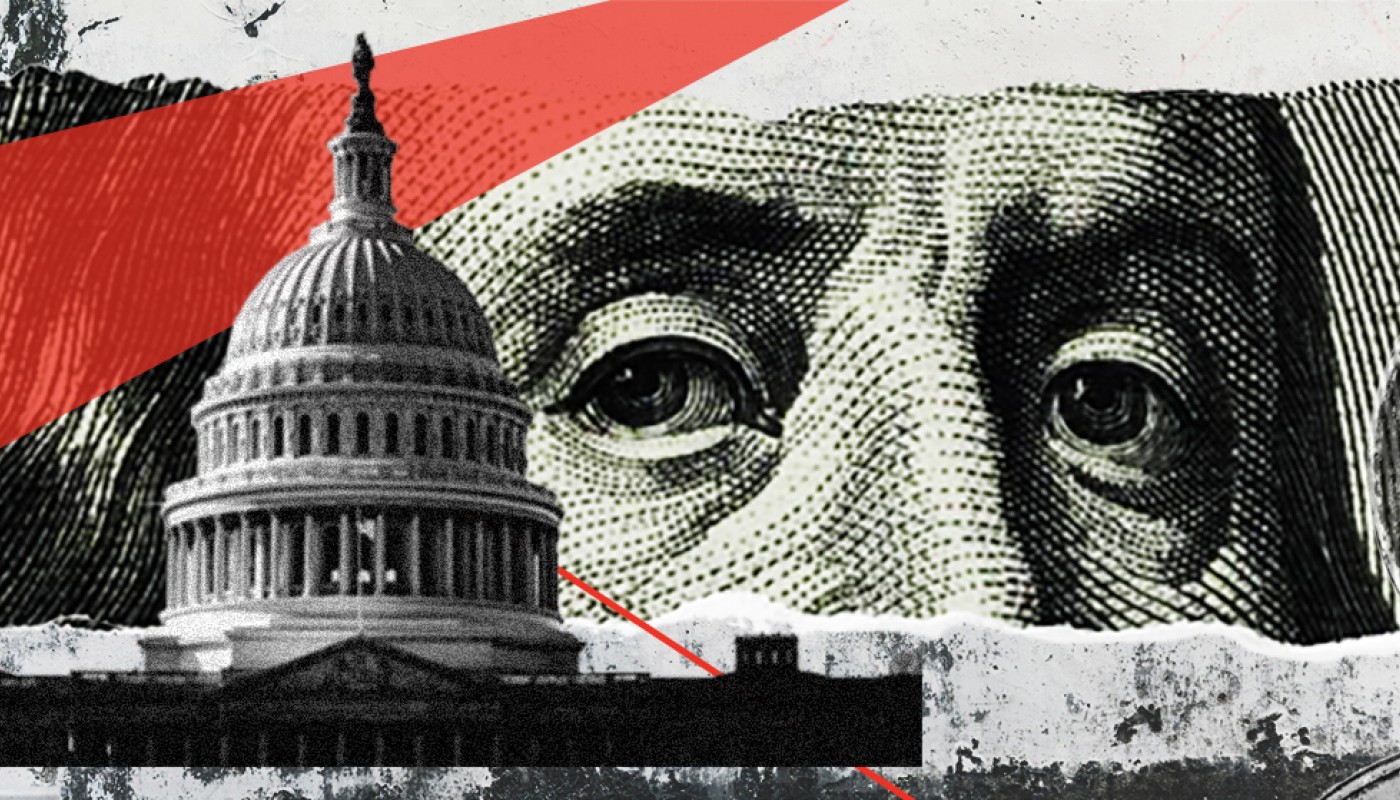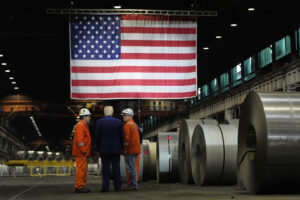Are Corporate Commitments Eroding US Power?
Proclamations of the end of US primacy and liberal world order have reached a crescendo in recent years. Meanwhile, US corporations accumulate record profits even as rising inflation squeezes average consumers. What explains this discrepancy, and how can it be reconciled?

Image Credit: Brennan Center for Justice
Proclamations of the end of US primacy and liberal world order have reached a crescendo in recent years. On the global stage, this has been evidenced by Russia’s invasion of Ukraine, China’s growing assertiveness, and the decline of democratic rule across the world. The Biden administration’s national security strategy explicitly declares the post-Cold War era of unrivaled hegemony to be “definitely over.” On the home front, it is paralleled by dysfunctional politics culminating in the January 6th insurrection, as well as yawning inequality, a thinning tax base, decreasing life expectancy, crumbling infrastructure, and a degenerating health and education system. Meanwhile, US corporations accumulate record profits even as rising inflation squeezes average consumers. Increasingly, these firms have seen their economic weight translate into growing political influence at home and abroad. What explains this discrepancy, and how can it be reconciled?
It is conventionally assumed that states and their corporations find themselves in a symbiotic relationship: states adopt policies supportive of businesses to ensure their competitiveness and buttress their profitability. In turn, corporate gains flow back to the state by generating jobs, technology, tax revenue, and economic growth, enabling the state to provide public services. This idea holds true for the domestic as well as international sphere. The dawn of neoliberal globalization in the 1970s, however, unleashed new dynamics that seem to have thrown this relationship off balance. Indeed, the interests and benefits of the American state and US multinational corporations have diverged to such an extent that MNC profitability can actually erode state power.
The concept of power described here is known as “infrastructural power,” and is marked by an ostensible paradox. It describes the capacity of the state to penetrate society and implement logistically political decisions through its realm, in order to centrally coordinate the activities of civil society through its own infrastructure. This comprises both a domestic and international dimension. The latter, so-called structural power, describes the state’s ability to shape and extend its rules into foreign national and international jurisdictions in key areas such as production, investment, or knowledge, primarily through means like international trade agreements. The domestic dimension entails the state’s ability to extract resources from society, such as knowledge, human capital, or taxation, and mobilize them for things like defense. This also includes its ability to catalyze innovation projects to maintain technological leadership.
The paradox is that for the United States, the projection of structural power abroad has to some degree come at the expense of infrastructural power at home. Specifically, the exercise of structural power since World War II has been to create, maintain, and expand an open global economic order, embodied in its global open-door policy. This ensured conditions favorable to global business and US multinational corporations in particular. The results are embedded in international institutions like the WTO and the IMF, as well as free trade and investment agreements such as NAFTA, which strive to eliminate trade barriers, facilitate the cross-border flow of capital, and protect foreign investments and intellectual property rights.
These institutions have certainly strengthened trade, investment, development, and other forms of international cooperation that have produced considerable wealth. But they have also enabled MNCs to downsize labor domestically and shift production and profits offshore, where labor is cheaper and tax regulation more accommodating. One result is that since the 1980s, corporate profits have soared, while federal corporate tax revenues have virtually stagnated. In 2020, 55 of the largest US corporations paid zero federal income taxes on over $40 billion in profits, even receiving $3.5 billion in rebates. In sum, corporate gains have not proportionately flowed back to the state in a symbiotic manner. Rather, the results of shifting production and profits abroad have eroded US infrastructural power by costing well-paying jobs and government revenue, hampering investment and innovation, and exacerbating inequality.
This eroding dynamic of US power leads back to the outsized influence of MNCs as the most influential force on US foreign policy. As political actors in their own right, they have been essential in shaping the open-door policy in the first place. Key pathways of influence include lobbying via Trade Advisory Committees and benefitting from affiliations with policymakers. Core provisions of major trade and investment agreements, such as NAFTA or TRIPs, are therefore often drafted by the corporate pen.
This state-corporate lopsidedness is relevant for today’s deteriorating US-China relations. Washington’s engagement policy toward China and its integration into the WTO was largely driven by transnationally oriented business. During the Clinton administration, China’s Most-Favored-Nation (MFN) status, which grants favorable trade provisions, had been at the discretion of the US government. Clinton had opposed it in his early days, primarily due to human rights concerns following the massacre at Tiananmen Square in 1989. When the White House issued an ultimatum to Beijing to revoke its MFN status, the globally-oriented American business community launched an aggressive lobbying campaign to make sure the door stayed open for business. Organized under the Business Coalition for U.S.-China Trade, MNCs with high stakes in the vast Chinese market like General Motors, AIG, and Boeing advocated for Chinese MFN status with no conditions attached. They argued that the PRC would be more likely to undergo democratic reform through trade rather than containment. Under this pressure, disillusioned with the ability to change China, and recognizing the need to cooperate with Beijing on issues like nuclear non-proliferation, President Clinton de-linked his China policy from human rights and paved the way for its accession to the WTO.
Over the next decades, China accelerated to global prominence at an incredible pace, becoming an economic powerhouse and lifting over 700 million people out of poverty. Until recently, it also enjoyed friendly relations with the United States. But the opening of China as the most potent boost to neoliberal globalization has also had severe repercussions in the US economy, particularly for labor. Mirroring the developments outlined above, the effect is sometimes referred to as the China Shock. China’s rapid integration into the global trade and investment regime, and the pouring of US MNCs into its seductive market, have taken their toll on American infrastructural power. Some have estimated the net loss of American jobs at 3.7 million between China’s WTO accession in 2001 and 2018, alongside the burgeoning bilateral deficit. The displacement of manufacturing in particular has moreover stifled wage growth and widened income inequality.
The failure to effectively mitigate these dislocations helped fuel the rise of Trump and anti-China sentiment that has morphed into heated geopolitical rivalry. Although the complexity of factors underlying this radical shift, which persists under the Biden administration, remains subject to research and debate, corporate pressure has played a significant role. Allegations of China’s “unfair trade practices” that restrict access to the Chinese markets reflect the history of US MNCs’ push for a widening global open door. They emanate from MNCs’ dissatisfaction with how the conditions of doing business in China undercut their profitability.
Understanding how the outsized role of US MNCs as political actors unleashes viscous dynamics for US power warrants critical reflection on the historical commitment to corporate profitability versus the resilience of social, economic, and democratic foundations at home. There are also geopolitical implications: as US-China relations succumb to strategic rivalry, hawkish policies that obsess over “winning” against China can overshadow narrow corporate interests at the expense of domestic resilience and welfare. This risks misallocating resources and spurring self-fulfilling security competition, not to mention potential wider conflict. Lastly, the erosion of the US state’s domestic capacity also impacts American soft power: its deteriorating socio-economic conditions and public infrastructure further chip away at America’s esteem as an attractive model to follow.
Matthew Geissendoerfer (he/him) is a second-year MA student at NYU’s International Relations Program. He is most interested in questions of global political economy, particularly regarding the role of the United States in the international system, its foreign policy, and the influence of multinational corporations. He is originally from Switzerland, where he obtained a BA in Political Science and Law. Spot him exploring the city by bike in his free time, photographing NYC’s multifaceted architecture.




